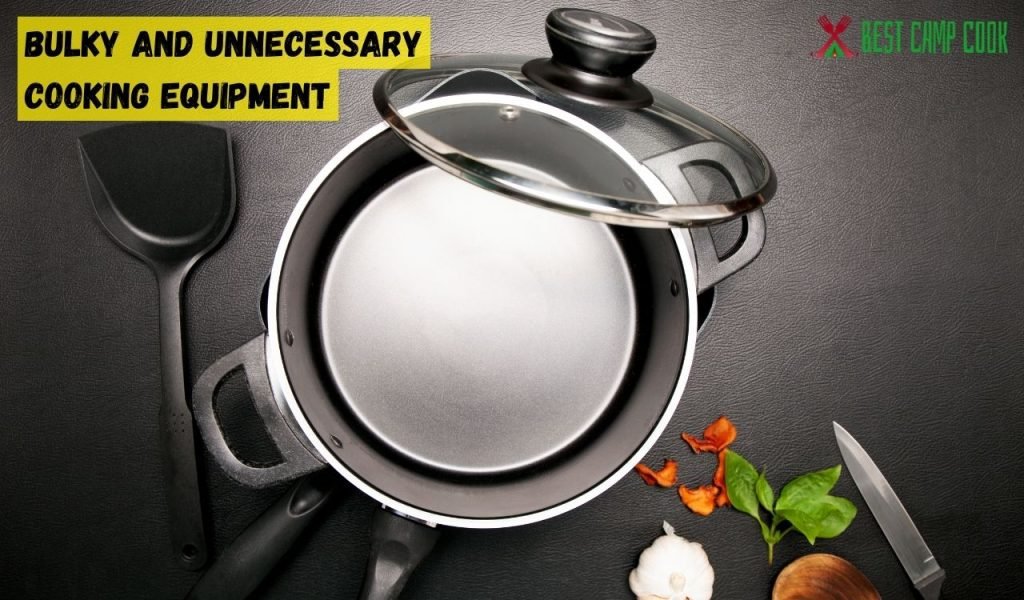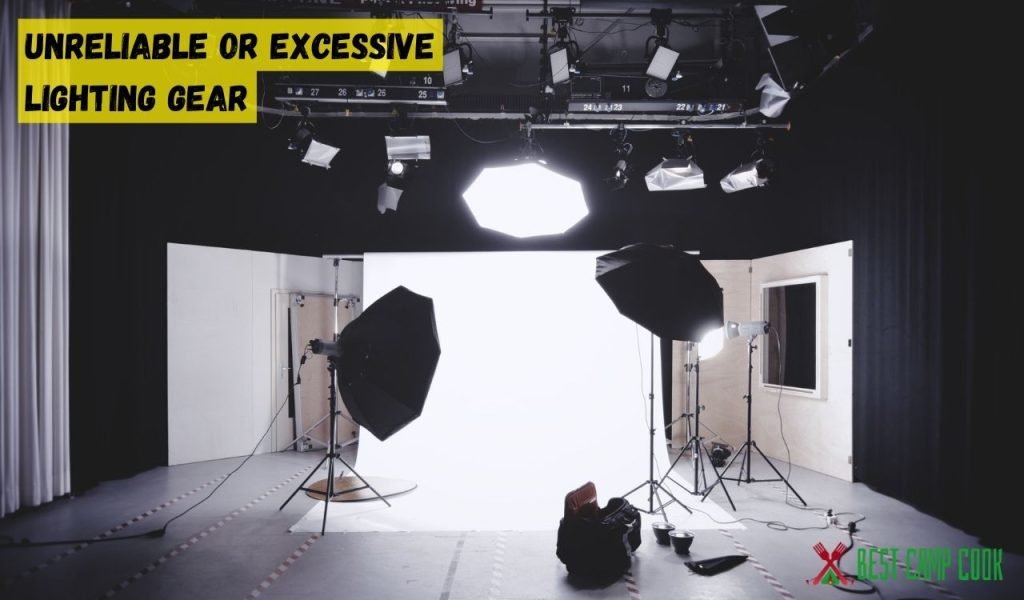Physical Address
304 North Cardinal St.
Dorchester Center, MA 02124
Physical Address
304 North Cardinal St.
Dorchester Center, MA 02124

Leave the camping blunders behind! Find out what not to bring camping and make your outdoor experience a breeze. Say goodbye to bulky gear, unnecessary supplies, and avoidable mishaps.
Pack light, pack smart, and embark on a memorable adventure. Get ready to learn the essentials of a hassle-free camping trip. Let’s explore what to skip and make your next outing a roaring success!
Main Summary: What Not to Bring Camping?
Enhance your camping experience with smart choices. Skip perishable foods to avoid spoilage and pests. Ditch fragile glass containers that risk shattering. Opt for lightweight, eco-friendly gear and essentials for a memorable and hassle-free outdoor adventure.

Cooking while camping can be a delightful experience, but it’s crucial to be mindful of the equipment you bring. Bulky and unnecessary cooking gear not only takes up valuable space but also adds unnecessary weight to your backpack or car.
Here are some specific items you should leave behind when it comes to cooking equipment:
Those giant pots and pans you rarely use at home are not ideal for camping. They take up a significant amount of space and add unnecessary weight to your pack. Opt for lightweight and compact cookware specifically designed for camping.
Look for sets that include versatile pots and pans that can serve multiple purposes.
Leave behind those large and heavy spatulas, ladles, and other cooking utensils that you rarely use. Instead, pack lightweight and multifunctional utensils specifically designed for camping. Consider collapsible options or utensil sets that come with compact storage cases.
While it might be tempting to bring along your favorite kitchen appliances, it’s best to avoid them when camping. Items like blenders, toasters, or slow cookers are unnecessary and take up precious space. Stick to essentials like a camping stove or a portable grill, which can handle most of your cooking needs.
While coffee is an essential part of many people’s morning routine, bulky coffee makers are not practical for camping. Instead, opt for simpler methods like a lightweight French press or a portable coffee filter.
These options take up less space and are easier to clean, making your mornings in the wilderness more enjoyable.
It’s easy to get carried away and pack too much cookware for your camping trip. Remember, you don’t need a separate pot or pan for every dish. Choose versatile cookware that can be used for multiple meals. This will significantly reduce the amount of gear you need to carry without compromising your cooking options.
While it may be tempting to bring along a large grill or an elaborate barbecue set, these items can take up significant space and add unnecessary weight. Instead, consider compact and lightweight alternatives like portable charcoal grills or foldable barbecue sets.
They are easier to transport and set up, allowing you to enjoy delicious grilled meals without the extra bulk.
Avoid packing specialized gadgets or tools that have limited uses. Examples include corn cob holders, fruit slicers, or specialized sandwich makers. Instead, focus on versatile and multipurpose tools that can serve various functions. This approach will save space and ensure you have the essentials covered.
Instead of carrying large plastic containers or bulky Tupperware, consider using lightweight and collapsible food storage options. Silicone bags or foldable containers take up less space when empty and can be easily packed away after use.
They are convenient for storing leftovers or packing food for your outdoor adventures.

While it’s natural to want to be prepared for various weather conditions and activities while camping, bringing excessive clothing and footwear can weigh you down and take up valuable space in your backpack or car. Here are some specific items you should leave behind when it comes to clothing and footwear:
It’s easy to overpack when it comes to clothing choices. Instead of bringing a different outfit for each day, focus on versatile pieces that can be mixed and matched. Choose lightweight, moisture-wicking fabrics that are suitable for layering. Pack items that can be easily washed and dried if needed.
Unless you’re camping in extreme cold conditions, bulky winter gear such as heavy coats, snow pants, and thick thermal boots are unnecessary. Opt for layering lightweight clothing instead to adapt to changing temperatures. Bring a warm jacket or sweater, along with waterproof and breathable outerwear.
Camping is a casual and relaxed activity, so there’s no need to pack formal attire. Leave behind dresses, suits, and dress shoes, as they take up space and are impractical for outdoor adventures. Focus on comfortable and functional clothing suitable for hiking, exploring, and relaxing around the campfire.
Avoid packing multiple pairs of shoes for different occasions. Instead, bring a sturdy pair of hiking boots or trail shoes that provide support and traction. These versatile footwear options are suitable for most outdoor activities.
Additionally, pack a pair of lightweight sandals or camp shoes for relaxation at the campsite.
Camping often involves long walks, hikes, and outdoor activities, so it’s important to prioritize comfort when choosing footwear. Avoid bringing uncomfortable or new shoes that haven’t been broken in. Stick to shoes that you’ve worn before and know are suitable for extended periods of walking or hiking.
Delicate and fashionable shoes have no place in the wilderness. Leave behind heels, delicate sandals, and shoes that can be easily damaged by rough terrain or wet conditions. Instead, choose footwear that is durable, water-resistant, and suitable for the outdoor environment.
Minimize the number of accessories you bring while camping. Leave behind unnecessary items such as excessive jewelry, belts, and hats. Focus on practical accessories like a sun hat, sunglasses, and a lightweight, waterproof watch. Remember to prioritize functionality over fashion.
Avoid bringing bulky laundry supplies such as an iron or large containers of detergent. Camping is a time to embrace simplicity, and these items are unnecessary. Instead, pack a small, travel-sized detergent or consider using eco-friendly soap that is suitable for handwashing clothes if needed.

While electronics have become an integral part of our daily lives, bringing fragile or bulky electronic devices may not be ideal for a camping adventure. Here are some specific items to reconsider before packing:
Camping is an opportunity to disconnect from screens and immerse yourself in nature. Bringing a large-screen TV or monitor is not only impractical but also detracts from the purpose of camping.
Instead, embrace the beauty of the natural surroundings and engage in activities that bring you closer to the outdoors.
While gaming consoles offer entertainment value, they require a significant amount of power and can be bulky to transport. Opt for outdoor activities such as hiking, fishing, or exploring instead. Use this opportunity to connect with nature and enjoy quality time with your camping companions.
Bringing a desktop computer while camping is not only cumbersome but also vulnerable to damage from the elements. Camping is a time to unplug and unwind, so leave your desktop computer at home and embrace the simplicity and tranquility of the outdoors.
While capturing memories through photography is a wonderful part of camping, it’s important to choose durable and compact camera equipment. Fragile and expensive camera gear can be at risk of damage from rough terrain, moisture, or accidental drops.
Consider investing in a rugged and waterproof camera or opt for a reliable smartphone camera.
While music can enhance the camping experience, bulky speakers or sound systems can disturb the tranquility of the environment and disrupt other campers. Instead, bring compact portable speakers or enjoy the sounds of nature.
Leave behind home appliances such as blenders, toasters, or coffee makers. These items require a stable power source and take up valuable space. Embrace the simplicity of campfire cooking and prepare meals with portable camping stoves and utensils.
Minimize the number of chargers and cables you bring. Excessive chargers add unnecessary weight and take up space. Prioritize essential chargers for your smartphone, camera, or other essential devices. Consider bringing portable power banks for emergency power needs.
Smart home devices that rely on an internet connection or delicate sensors may not function optimally in remote camping locations. Leave these devices at home and embrace a break from the digital world. Instead, focus on connecting with nature and the people around you.

Proper lighting is essential when camping, but it’s crucial to strike a balance between practicality and overpacking. Here are some points to keep in mind regarding unreliable or excessive lighting gear:
While flashlights are a must-have for camping, cheap and unreliable ones can quickly become a nuisance. They may have weak beams, easily drain batteries, or break after minimal use.
Invest in high-quality, durable flashlights that provide sufficient brightness and longevity. Look for features like adjustable beam settings, long battery life, and water resistance.
While lanterns can create a cozy atmosphere and illuminate your camping area, relying solely on battery-powered lanterns can become problematic. Batteries may drain quickly, leaving you without light when you need it most. Consider using rechargeable lanterns or lanterns that offer both battery and solar-powered options. This way, you can recharge them during the day and ensure continuous illumination at night.
Bringing an excessive amount of lighting gear can be unnecessary and burdensome. Avoid overpacking by assessing your actual lighting needs. Determine the number of lights required based on the size of your camping area and the activities you plan to engage in after dark.
Opt for versatile lighting options, such as headlamps or portable LED lights, that can serve multiple purposes.
Delicate lanterns made of glass or other fragile materials may not withstand the rigors of outdoor conditions. They can easily break during transport or while setting up camp. Choose lanterns made of sturdy materials like plastic or metal that can handle rough handling and withstand outdoor elements. Look for lanterns with built-in handles or hooks for convenient placement.
While having sufficient lighting is important, excessive brightness can be disruptive to both your camping experience and the natural environment. Avoid bringing extremely bright lights that may disturb wildlife, other campers, or interfere with stargazing opportunities.
Opt for adjustable lighting options or lanterns with dimming features to adjust the brightness to your needs.
Camping often involves exposure to various weather conditions. It’s crucial to choose lighting gear that is weather-resistant and can withstand rain, wind, or humidity. Look for lanterns or lights with IPX ratings indicating their water and dust resistance capabilities.
This ensures your lighting gear will function reliably even in challenging weather conditions.
Consider the energy efficiency of your lighting gear to minimize battery usage and environmental impact. LED lights are a popular choice due to their energy efficiency and long battery life. They consume less power while providing bright illumination. Additionally, they generate less heat, making them safer to handle in a camping environment.

While engaging in recreational activities is a great way to enjoy your time outdoors, it’s crucial to be selective in the sports equipment you bring along. Consider the following points:
Water-based activities can be a refreshing addition to your camping experience, but it’s important to be mindful of the size and weight of water toys. Consider the following guidelines:
While it’s tempting to bring a variety of games for entertainment, it’s important to be selective and focus on essential options. Consider the following tips:
Music can enhance the camping atmosphere, but bringing large or fragile musical instruments can be impractical. Consider the following recommendations:
While outdoor games can provide entertainment and enjoyment during camping trips, it’s important to consider the size and setup requirements of these games. Here are some points to keep in mind:
If you’re planning water-based activities during your camping trip, it’s important to avoid packing excessive water sports gear that can add bulk and weight to your camping gear. Consider the following:
While camping gadgets can be enticing, it’s important to avoid packing unnecessary or specialized gadgets that may have limited utility during your camping trip. Consider the following tips:
While adding personal touches to your campsite can create a cozy and inviting ambiance, it’s important to avoid going overboard with excessive campsite decorations. Consider the following suggestions:

When it comes to food and beverages, it’s important to strike a balance between having enough to sustain you during your camping trip and avoiding excess that can lead to unnecessary weight and waste. Here are some tips to help you pack smartly:
Before heading out, create a meal plan for each day of your camping trip. Consider the number of people, the duration of your stay, and the activities you’ll be engaged in. This will help you estimate the right quantity of food and avoid overpacking.
Choose food items that are lightweight and take up minimal space. Opt for dehydrated or freeze-dried meals, which are not only lightweight but also easy to prepare. Additionally, consider packaging individual servings to reduce excess packaging and waste.
While it’s tempting to bring a variety of snacks and treats, limit yourself to essential items. Focus on nutritious and energy-dense foods such as trail mix, granola bars, and dried fruits. These will provide sustenance without adding unnecessary weight.
Perishable foods require proper storage and may need to be kept in coolers with ice. Be mindful of the limited space in coolers and pack perishables that are necessary for your planned meals. Opt for long-lasting items like hard cheeses, cured meats, and fruits that can withstand the trip without refrigeration.
Remove excess packaging from food items before packing. Transfer items into resealable bags or containers to save space and reduce waste. Remember, bulky packaging takes up valuable room in your camping gear.
Stay cool and hydrated during outdoor activities! Hydration is crucial, but carrying excessive amounts of beverages can add unnecessary weight. Instead of packing heavy bottles, consider using collapsible water containers or water bladders that can be easily refilled from natural water sources at your campsite.
When packing food and beverages, consider how you will handle waste. Bring reusable containers, cutlery, and cloth napkins to minimize single-use items. Pack garbage bags to collect and dispose of waste properly, leaving your campsite clean and pristine.
When preparing for a camping trip, it’s important to be mindful of the personal items you choose to bring. Bulky or heavy items can weigh you down, take up precious space in your backpack or vehicle, and make your camping experience less enjoyable. Here are some tips to help you streamline your gear:
Before packing any personal item, ask yourself if it is truly necessary for your camping trip. Consider the activities you’ll be engaged in and the specific needs you have. Focus on essential items that will enhance your comfort, safety, and enjoyment during your outdoor adventure.
While it’s tempting to pack a variety of clothing options, aim for versatility and practicality. Choose lightweight and quick-drying clothing that can be layered for changing weather conditions.
Opt for multi-purpose items like convertible pants or jackets with removable liners. Limit the number of footwear options and focus on sturdy, comfortable shoes suitable for hiking and outdoor activities.
Toiletries are essential, but bulky containers can take up unnecessary space. Opt for travel-sized containers or transfer products into smaller, lightweight containers.
Consider multipurpose items such as a combination shampoo-conditioner or a biodegradable soap that can be used for body, hair, and dishes.
When it comes to camping equipment, there are often lighter and more compact alternatives available. Invest in lightweight camping gear such as tents, sleeping bags, and camping chairs. Look for collapsible or inflatable options that can be easily packed and take up minimal space.
Bulky recreational items like large board games or heavy sports equipment may not be practical for camping trips. Instead, opt for compact entertainment options such as playing cards, a lightweight frisbee, or a portable speaker for music.
Embrace the simplicity of nature and engage in activities that don’t require excessive equipment.
If you’re camping with a group, coordinate with your fellow campers to share communal items. Items like cooking utensils, camping stoves, and tools can be shared among the group, reducing the overall weight and bulk of individual packs.
While it’s important to minimize bulk and weight, don’t compromise on items that ensure your comfort and safety. Essential items like a first aid kit, a reliable flashlight or headlamp, and appropriate camping gear for the expected weather conditions should always be included.

When it comes to packing food and beverages for a camping trip, the choice of coolers plays a crucial role in preserving freshness and ensuring a delightful culinary experience.
However, bringing multiple or large-sized coolers can be cumbersome and impractical. Here are some tips to help you optimize your cooling solutions for camping:
Before selecting a cooler, assess your specific cooling requirements. Consider the duration of your trip, the number of people, and the types of perishable items you plan to bring. This assessment will help you determine the appropriate size and number of coolers required.
Invest in a high-quality cooler that offers excellent insulation and temperature retention. Look for coolers with thick walls and strong lids that can effectively keep your food and beverages cold for an extended period. Consider options with built-in features like drainage plugs and dividers for added convenience.
Instead of bringing multiple large-sized coolers, consider using compact and versatile cooler options. Look for cooler backpacks, soft-sided coolers, or cooler bags that are lightweight, easy to carry, and can fit into tight spaces.
These alternatives are often more practical for camping trips and can still provide adequate cooling capacity.
When packing your cooler, maximize the use of space by organizing items strategically. Place heavier and bulkier items at the bottom and lighter, more delicate items on top. Utilize ice packs or frozen water bottles to keep the cooler temperature low without relying solely on bagged ice, which can take up valuable space.
Adopt a minimalist approach when selecting food and beverages to bring camping. Opt for non-perishable items that require minimal cooling or can be stored at room temperature. Pack items that can be easily consumed without extensive preparation or refrigeration.
If your campsite provides communal refrigeration or ice facilities, take advantage of them. Coordinate with fellow campers to share communal coolers, allowing you to bring less and still have access to chilled items when needed.
Plan your meals in advance to minimize the amount of perishable food you need to bring. Opt for ingredients that can be used in multiple meals or dishes, reducing the need for excessive food storage. Consider pre-cooking and freezing meals to extend their freshness and reduce reliance on coolers.
Keep your cooler organized throughout your camping trip. Separate items into different compartments or use dividers to prevent cross-contamination and make it easier to locate specific items. Regularly remove any melted ice or spoiled food to maintain a clean and efficient cooling environment.
In conclusion, when it comes to camping, it’s important to pack wisely and avoid bringing unnecessary items that can weigh you down and detract from the overall experience.
By being mindful of bulky and unnecessary cooking equipment, excessive clothing and footwear, fragile or bulky electronics, unreliable or excessive lighting gear, non-essential recreational items, excessive food and beverages, bulky or heavy personal items, and multiple or large-sized coolers, you can streamline your camping gear and focus on enjoying nature, relaxation, and quality time with loved ones.
Remember, the key is to strike a balance between comfort and practicality, ensuring that you have the essentials while keeping your load light. Happy camping!
Avoid bringing bulky and unnecessary cooking equipment, excessive clothing and footwear, fragile or bulky electronics, unreliable or excessive lighting gear, non-essential recreational items, excessive food and beverages, bulky or heavy personal items, and multiple or large-sized coolers.
While it’s not necessary to completely avoid bringing electronics, it’s best to be mindful of fragile or bulky devices. Consider bringing durable and compact options and prioritize being present in nature rather than relying heavily on technology.
Portable grills can be a great addition to your camping gear, but it’s essential to choose compact and lightweight options. Avoid bringing large or heavy grills that can be difficult to transport and set up.
It’s important to bring appropriate clothing and footwear for varying weather conditions, but avoid overpacking. Pack versatile items that can be layered and mix-and-matched, minimizing the need for excessive clothing and footwear.
Avoid bringing excessive amounts of perishable food items that require refrigeration. Opt for non-perishable foods, such as canned goods, dried fruits, and granola bars, which are lightweight and easy to store.
While it’s nice to have some comfort items like camping chairs, be mindful of non-essential recreational items that take up space and add weight to your gear. Prioritize essential items and consider the practicality and space limitations of your campsite.
It’s best to avoid bringing multiple or large-sized coolers unless necessary. Optimize space and consider using cooler bags or compact cooler options to minimize the load and maximize efficiency.
Each campground or park may have its own rules and restrictions regarding pets. It’s important to check the specific regulations of your chosen camping location before bringing your pet along.
Renting camping equipment or borrowing from friends can be a cost-effective option, especially if you’re unsure about investing in your own gear. However, be sure to thoroughly inspect rented or borrowed equipment for any damage or missing parts before your trip.
Some campsites provide firewood, while others require you to bring your own or purchase it on-site. Check the regulations of your campsite and plan accordingly. If you’re allowed to bring firewood, consider buying locally sourced firewood to prevent the spread of invasive species.